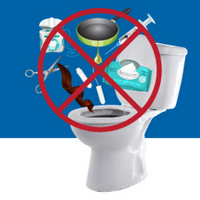Be flush-savvy! Toilets are not garbage cans.

As residents continue to use more wet wipes due to the pandemic, we want to remind you that flushing wipes can create a costly and messy sewer back-up in your home.
Since the beginning of the COVID-19 pandemic, many utilities across Canada and around the world are seeing an uptick in discarded masks, gloves and sanitary wipes being flushed down the toilet.
This garbage congeals with fats, oils and greases (FOGs) – that are often mistakenly poured down the drain – creating costly clogs in both residences and the wastewater collection and treatment systems.
Despite the higher demand for disinfectant and baby wipes, Utilities Kingston’s wastewater operators have observed only a small local increase in wipes being flushed – and they have observed no increase in flushed masks and gloves in the wastewater treatment system.
Many residents are doing the right thing by keeping wipes, fats, oils and greases out of their toilets and drains, and we thank you. Still, we want everyone to be aware, when you flush anything other than toilet paper, you’re putting your home, the wastewater collection system, treatment facilities, and the health of our operators at risk.
Never flush wipes, period products, fats, oils or greases
Understanding the problem:
- Throughout the pandemic, there has been a higher demand for disinfecting wipes, baby wipes and toilet paper.
- Toilet paper is designed to break down and dissolve. All other paper products are made of sturdy, non-woven fibers that don’t break down. These have costly impacts for residences, wastewater systems and the environment.
- Unlike toilet paper, wipes don’t easily break down when flushed, even the ones labeled “flushable.”
- Flushed wipes can also combine with FOGs to create a large mass of solid waste in the sewer system.
- Once flushed, wipes can clog sewer lines, pumps and pipes, causing sewage overflows in homes and the environment. These clogs can create equipment damage, costing ratepayers millions, and can compromise the safety of wastewater operators.
Know your three Ps: only flush pee, poo and (toilet) paper
Remember that toilets are not trash cans or recycling boxes! Here are the dos and don’ts of proper disposal of some of the items that can’t be treated in the sewage system:
- Wipes of any kind – Sanitizing, baby and hand wipes go in the garbage, even if the package claims they are flushable (they aren’t).
- Fats, oils and greases – Wipe greasy pans with a paper towel and put it in the Green Bin. Dispose of solidified fats and grease in a 100 per cent paper cup in your Green Bin (but watch out for leaks). Dispose of cooking oil in a screw-top container in your garbage.
- Period products – These go in the garbage, along with associated applicators and plastic packaging, even if the package claims they are flushable. Or consider a reusable period cup and help reduce single use plastics at the same time.
- Larger food particles – Use a strainer in your sink to catch food scraps and other solids. These go in your Green Bin.
Cooking oil, butter and margarine, meat fats, salad dressings, sauces, and gravies are all types of FOGs. When poured down the drain or flushed down the toilet, they solidify and build up inside plumbing pipes, creating a sewer back-up risk in your home.
Other top clog offenders that should never be flushed include paper towels, rags, dental floss and hypodermic needles. Hypodermic needles are particularly problematic, as they create a hazard for wastewater staff.
To find out how to properly dispose of these items and more, use the City of Kingston’s Waste Sorting Look-up tool.
Learn how to protect your home and health by knowing what not to flush.